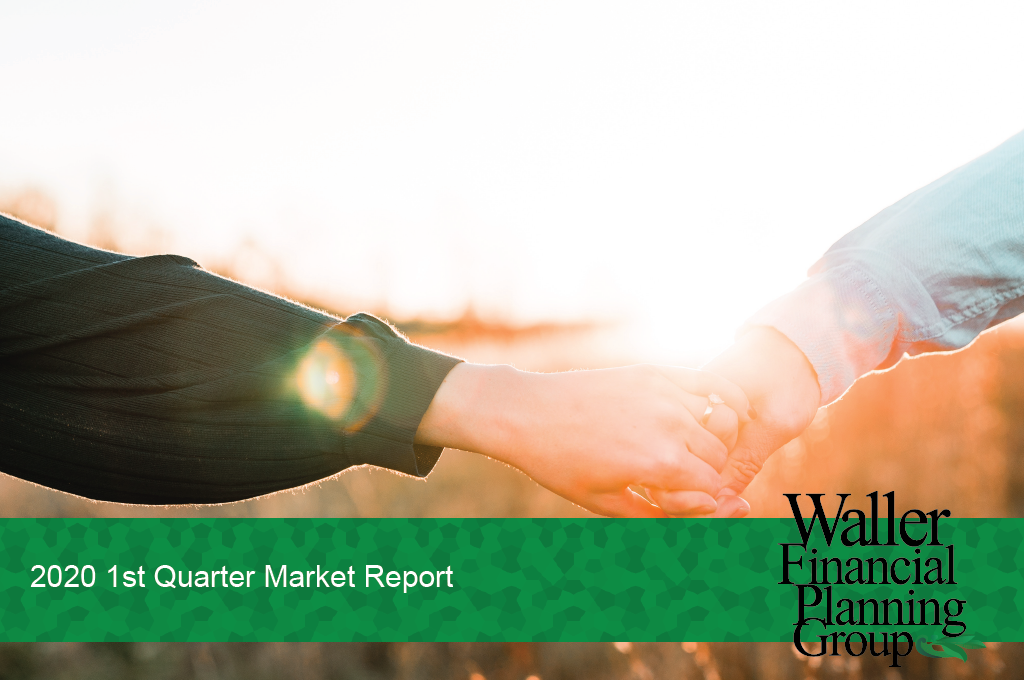
The COVID-19 pandemic has caused us to face unprecedented challenges that we previously could not have imagined. Our thoughts and prayers go out to everyone, especially those that have been directly impacted by the virus as well as the people on the frontlines managing it.
A lot has changed in the last six weeks. At the end of January, we were in the longest running bull market in our history, and looking at a global economic situation that was stabilizing. The U.S – China trade war was making progress, and it appeared the United Kingdom’s exit from the Eurozone was finally worked out. And then, a global pandemic changed everything. Large portions of the economy are shut down, and millions of people are suddenly unemployed. Everyone is impacted by this. While this financial downturn is daunting, the situation is even more chilling because the real problem is a health crisis.
We mentioned in our year-end 2019 quarterly letter that we did not believe a recession was looming, but we maintained a cautious investment outlook nevertheless. It is pretty clear now that we are going to see a recession. The COVID-19 pandemic completely overwhelmed markets, resulting in one of the worst quarters for investing ever. Stocks dropped faster than ever before. For the quarter, domestic stocks were down 20% to 30%, while foreign stocks were down about 23%. Fortunately, aggregate bonds produced a positive return of a bit more than 3%, while foreign bonds were up 2%[1]. We were also fortunate that markets rallied about 15% off of the bottom in just 4 trading days near the end of the quarter.
We are quite pleased with how quickly the Federal Reserve Bank (Fed) took action. They took both broad and deep measures to reassure markets, introduce liquidity and add stability during a time of unfettered selling. By historic measures, Congress also acted very quickly to get emergency fiscal stimulus packages passed. They passed 3 bills during the month of March to aid in combatting the economic fallout from closing down large parts of the economy. The first bill provided stimulus of a little over 8 billion dollars, followed by another bill that is projected to top 100 billion dollars of support. The third bill was a massive 2.2 trillion dollar aid package, focused on providing direct support to individual taxpayers, businesses, and state and local governments.
While the actions taken by Congress and the Fed will not stave off a recession, they will be beneficial in reducing the depth and length of the recession. At this time, our expectations are for a sharp, but short recession. It is highly likely that the unemployment figures will exceed those of the Great Depression, but we will not experience that type of economic fallout.
Since Waller Financial’s founding in 1985, we have seen some major bear markets, which are drops of 20% or more. In 1987, the market drop was 31%. In 2000 – 2002, the market dropped 33%. In the 2008-2009 Great Recession, the market dropped about 50%. In those three instances, and all the bear markets that have come before, the market rebounded and moved to new highs. In 1987, the recovery took 2 years, while the 2000-2002 and the 2008-2009 recoveries took about 4 years. In the last 40 years, we have seen 12 market corrections, 8 bear markets, and 5 recessions. There were different reasons for all of these calamities, but the common theme is that the market rebounded and moved to new highs.
Successful investing is having a sound strategy and the discipline to adhere to it. During these types of volatile markets, it is normal to feel overwhelmed and uncertain; however, we cannot allow emotion to dictate investment decisions. We cannot say with any certainty how low the market will go, but taking action for the sake of “just doing something” is wrong. Instead, we are concentrating on things that we can control: asset allocation, portfolio rebalancing, tax-loss harvesting, interpreting tax law changes, implementing actionable plans, and buying stocks as they decline in value.
We appreciate the faith and trust you have placed in us. We will remain vigilant in our responsibility to help you achieve your desired Lifestyle and Legacy. We are always here to discuss the markets, your portfolio, your financial plan, or any other thoughts or concerns you have. Please do not hesitate to reach out.
Warmest regards,
The Waller Team
[1] Morningstar Office: Large Cap U.S. stocks as measured by the S&P 500 Index, Medium Cap U.S. stocks as measured by the S&P Mid Cap Index and Small Cap U.S. stocks by the Russell 2000 Index. Foreign stocks as measured by the MSCI EAFE ND Index and the Emerging market stocks measured by the MSCI EM ND Index. Fixed Income/Bonds as measured by the Barclays U.S. Aggregate Bond Index, Barclays Municipal Index, and the Citi World Government Bond Index. Real estate as measured by the Dow Jones U.S. Select REIT Index. Commodities as measured by the Bloomberg Commodity Index. Inflation as measured by the U.S. BLS Consumer Price Index All Urban SA 1982-1984.
The opinions voiced in this letter are for general information only and are not intended to provide specific advice or recommendations for any individual. All performance referenced is historical and is no guarantee of future results. The economic forecasts set forth in this printing may not develop as predicted and there can be no guarantee that strategies promoted will be successful. Stock investing involves risks, including loss of principal. Bond values will decline as interest rates rise and bonds are subject to availability and changes in price. There is no guarantee that a diversified portfolio will enhance overall return or outperform a non-diversified portfolio. Diversification does not protect against market risk.





